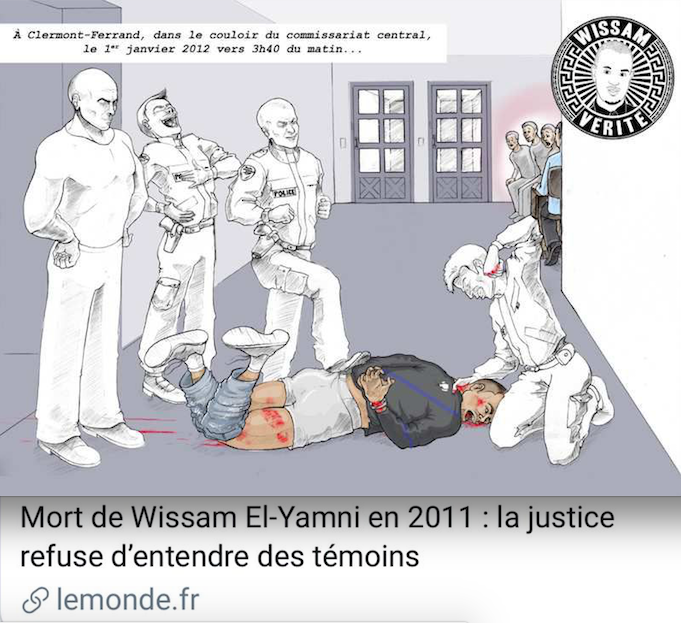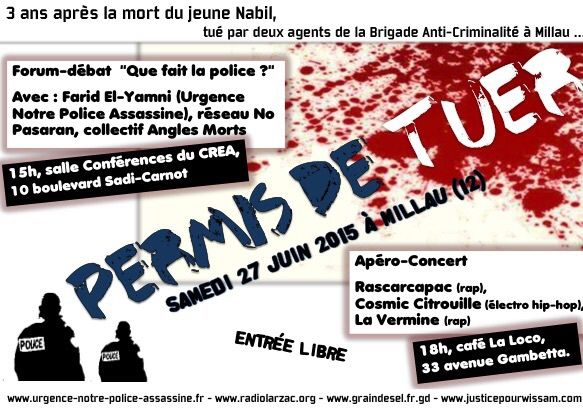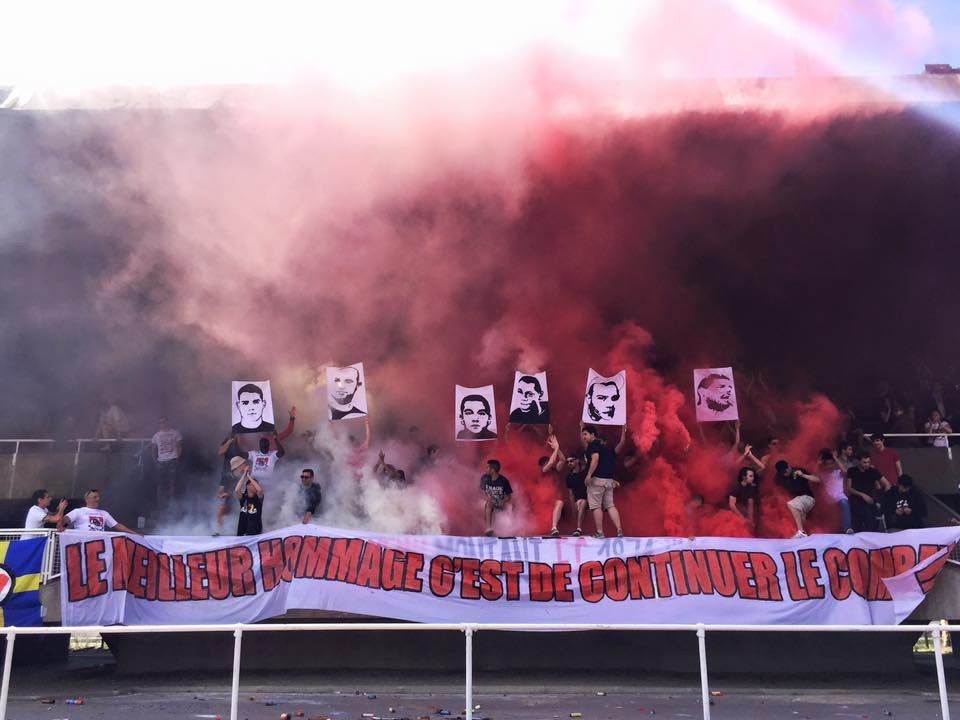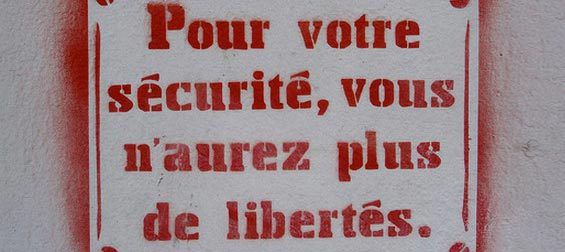http://quartiersxxi.org/face-aux-inegalites-devant-la-police-et-la-justice
"Au delà de l’indignation suite à la relaxe des policiers dans l’affaire Zyed et Bouna, réfléxion sur les stratégies de lutte contre les inégalités sociales et le racisme institutionnel devant la police et la justice.
La relaxe prononcée le 18 mai 2015 par le tribunal de Rennes sur l’affaire Zyed et Bouna – qu’il faudrait plutôt appeler l’affaire des policiers Sébastien Gaillemin et Stéphanie Klein – a provoqué l’indignation générale des acteurs associatifs et politiques des quartiers populaires et bien au delà. Dans une affaire de « non assistance à personne en danger », l’enjeu juridique porte sur l’existence, ou non, d’une « une conscience claire d’un péril grave et imminent ». La phrase prononcée par Gaillemin sur les ondes de la police – « S’ils entrent ici, je ne donne pas cher de leur peau » – semblait être une preuve suffisante de la conscience du danger. Ce n’est pas l’avis des juges, selon lequels « si Sébastien Gaillemin avait eu conscience d’un péril grave et imminent, il n’aurait pas manqué de réagir ». Donc le policier dit clairement avoir conscience du péril mais, en fait, ce n’était qu’une pensée en l’air puisque, s’il avait vraiment eu conscience du péril, il serait allé sauver Zyed Benna et Bouna Traoré d’une mort certaine.
Ce raisonnement juridique, qui exonère les policiers de toute faute professionnelle, illustre parfaitement ce que le sociologue algérien Abdelmalek Sayad appelait la « complicité objective » ou la « solidarité organique » entre la justice et certains inculpés lorsqu’il s’agit de la mort d’enfants d’ouvriers immigrés postcoloniaux. Dans son fameux article de 1985, « Exister, c’est exister politiquement » [1], il passe en revue les principaux enjeux de la lutte pour les « droits civiques » et revient sur une question centrale : l’égalité devant la justice.
« Le tribunal est un autre lieu où sévit la forme la plus insidieuse, parce que la plus cachée, du racisme ; la moins visible, non seulement la moins énoncée et la moins dénoncée, mais aussi la plus difficilement énonçable et dénonçable. C’est là qu’il est le plus difficile de soupçonner le racisme, alors que c’est là aussi qu’il exerce ses ravages. Ainsi, rien n’empêchera la mère ou le père d’un enfant assassiné, ni les camarades de quartier de cet enfant assassiné (camarades eux-mêmes assassinables parce que partageant avec lui les mêmes caractéristiques d’origine et d’histoire, les mêmes conditions sociales, le même habitat) de voir dans le comportement du juge ainsi que toute la Cour, dans le verdict rendu souvent relativement clément pour l’assassin, une manière de complicité objective avec l’assassin qui est leur compatriote, une marque de solidarité plus organique et qui n’a pas besoin de réfléchir pour exister. « Solidarité de sang » ! dit-on. On connaît l’expression de « justice de classe » ; ici, il faudrait parler de « justice de caste », celle-ci venant doubler celle-là. »
Le constat de Sayad s’est confirmé depuis. Les inégalités structurelles fondées sur la classe et la race opèrent lorsque les membres des classes populaires sont victimes de violences policières et lorsqu’ils sont interpellés et condamnés. Ces inégalités se produisent à la fois dans le traitement policier (contrôle, interpellation, garde-à-vue, poursuite, etc.) et le traitement judiciaire (mise en examen, comparution immédiate, type de peine, etc.). Les habitants des quartiers populaires ne sont pas paranoïaques : le « classisme » (traitement inégal selon la classe sociale) et le racisme institutionnels sont des réalités mesurées depuis des décennies par les sciences sociales.
Inégalités devant la police et la justice
Concernant le traitement policier, l’enquête de Fabien Jobard et René Lévy de 2009 montre que les policiers sur-contrôlent la population masculine, habillée de manière typiquement jeune et racisée.
« Selon les sites d’observation, les Noirs couraient entre 3,3 et 11,5 fois plus de risques que les Blancs d’être contrôlés au regard de la part de ces deux groupes dans la population disponible à être contrôlée par la police (ou la douane). Les Arabes (…) couraient quant à eux entre 1,8 et 14,8 fois plus de risques que les Blancs d’être contrôlés par la police (ou la douane) sur les sites retenus, également au regard de la composition de la population disponible. »
Plus récemment, Nicolas Jounin et son équipe, montrent la même chose grâce à une enquête par la méthode des questionnaires.
L’inégalité de classe concerne aussi le traitement judiciaire stricto sensu. En 1972-1973, Nicolas Herpin [2] avait étudié 350 affaires au tribunal de grande instance de Paris : pour des faits équivalents, il démontrait déjà une sur-pénalisation des jeunes, des milieux populaires et des étrangers. En 1985, un spécialiste de la justice pénale [3] invente une célèbre formule : « l’amende est bourgeoise et petite-bourgeoise, l’emprisonnement ferme est sous-prolétarien, l’emprisonnement avec sursis est populaire ».
Par contre, si nous avons des enquêtes sur l’inégalité raciale devant la police, il n’existe pas de données pour la justice en raison de l’absence de statistiques judiciaires contenant une variable ethnique. Aux États-Unis, il est établi que la sur-représentation des minorités, en particulier noire, dans les prisons est la conséquence directe de la guerre contre la drogue, qui est aussi une guerre contre les minorités. En effet, la pénalisation des stupéfiants vendus et consommés par les minorités et le traitement policier de la misère sociale débouchent sur un système pénal qui reproduit brutalement les inégalités sociales et raciales. Alors qu’ils représentent environ 13 % de la population totale, les Africain-Américains représentent 43 % des 2,3 millions de prisonniers en 2008 ; les Africains-Américains et les Hispaniques représentent 58 % de l’ensemble de la population carcérale [4].
En France, certains sociologues ont observé la sur-représentation des hommes noirs et arabes, dont des musulmans, dans les prisons françaises. Claire de Galembert n’hésite pas à parler de racisme institutionnel concernant la gestion de l’islam en prison. Pour Didier Fassin, les hommes noirs et arabes « représentent les deux tiers de l’ensemble des détenus et même plus des trois quarts des moins de 30 ans » [5], mais aucune donnée quantitative permet d’avoir une vision précise du phénomène. D’où l’intérêt de la campagne « Guerres aux drogues, guerre raciale ».
Quand les morts sont minoritaires
Si la justice n’est pas équitable lorsque les classes populaires et les minorités racisées sont soupçonnées de crime ou délit, elle ne l’est pas non plus lorsque les mêmes populations sont victimes. Il faut bien sûr distinguer les crimes racistes « classiques » – fondés sur une intention raciste – et ce que les militants des années 1980 ont appelé les crimes « sécuritaires » – mort d’un jeune à la suite d’une intervention policière brutale. Les crimes sécuritaires peuvent correspondre à des crimes racistes mais pas systématiquement, puisque de nombreux jeunes non-racisés subissent aussi cette forme particulière de violence policière.
Pour illustrer la justice de classe et de caste, Sayad évoque une affaire exemplaire : Ahmed Bouteldja, 23 ans, assassiné le 28 septembre 1982 à Bron par Jean-Claude Lopez. Même si la famille considère que le jugement est trop clément, le prévenu avait été condamné le 5 décembre 1985 à cinq ans de prison, dont deux avec sursis. Ce jugement tranche avec la longue série des crimes racistes et sécuritaires qui débouche généralement sur des non-lieux, relaxes ou des peines très clémentes, comme celle du CRS Taillefer à Marseille : seulement dix mois de prison dont quatre avec sursis pour l’assassinat de Houari Ben Mohammed (20 ans) le 18 octobre 1980. Dans l’affaire Bouteldja, la justice avait rompu modestement avec la solidarité organique, d’où la rancoeur des policiers, qui s’étaient littéralement déchaînés contre la famille et leurs proches dans les couloirs du tribunal de Lyon.
Grâce aux mobilisations continues des associations anti-racistes, surtout après la Marche pour l’égalité et contre le racisme de 1983, les peines contre les crimes racistes se sont alourdies lorsqu’il s’agissait d’inculpés civils. Par exemple, le militant d’extrême droite Patrick Borneat écope d’une peine de quinze ans de prison ferme le 8 février 1990 pour le meurtre d’Amar Abidi (42 ans) à Nice le 22 juin 1987. Ainsi, le nombre de crimes racistes « classiques » a fortement diminué depuis une trentaine d’années : on en dénombrait environ 150 dans les années 1970 et 200 dans les années 1980. Il y en a beaucoup moins depuis les années 1990.
Cependant, le racisme est toujours « inscrit dans les institutions et dans leur fonctionnement lorsqu’il s’agit de cette catégorie particulière de sujets et d’assujettis, qu’on appelle ’’immigrés’’ [6] ». La justice ne traite pas de la même manière un skinhead et un policier. L’enjeu de la solidarité étatique entre police et justice est double. Cette solidarité est non seulement dénoncée par les habitants des banlieues en raison de la perception d’une « impunité » policière, mais elle est aussi revendiquée par certaines composantes de l’État. L’objectif est alors de « tenir ses troupes », d’éviter de ternir la réputation l’institution policière et de diminuer la légitimité de son action dans les quartiers populaires. La volonté de maintenir les liens de solidarité étatique conduit les individus ou organismes chargés de sanctionner les violences policières, notamment l’Inspection générale de la police nationale (IGPN), à faire preuve d’une certaine clémence concernant l’usage « abusif » de la violence physique.
Autrement dit, le principe de solidarité étatique revient à ne pas faire « perdre la face à l’État » lorsque la police faillit. La reconnaissance étatique des déviances policières violentes est considérée comme une perte de légitimité politique. Selon ce point de vue, la légitimité de la police est fondée sur un « bon » usage de la violence et elle s’effrite dès que l’État admet publiquement l’idée d’une forme institutionnelle (et non exceptionnelle) de « mauvais » usages. Ainsi, l’équation « reconnaissance publique des déviances policières violentes = discrédit et perte de légitimité de la police » est inscrite dans les catégories de pensée des représentants des forces de l’ordre et de la justice.
Au delà de l’indignation
Une fois qu’on a fait le constat des inégalités sociales et du racisme instititionnel, quelles solutions se présentent aux partisans d’une égalité réelle ? Il est irresponsable et dangereux de faire appel à la vengeance : la vendetta, souvent proclamée par des militants non-assassinables, ne bénéficie qu’aux puissants et ne peut que fragiliser les populations assassinables. Pourquoi pas faire des appels à la « décolonisation de la République », mais où est le programme politique décolonial pour transformer la police et la justice ? Exiger un reçu pour chaque contrôle d’identité, une plaque de policier visible ou l’enregistrement vidéo des interpellations ? Ces mesures sont certes intéressantes pour limiter la récurrence des contrôles, mais ce n’est malheureusement qu’un pansement (pas encore posé) sur une plaie ouverte. Il existe pourtant des expériences politiques qui méritent d’être rappelées pour mieux saisir les marges de manœuvre dont on peut disposer.
Le droit peut (aussi) être une arme
Durant plus d’une vingtaine d’années, les militants du MIB (Mouvement de l’immigration et des banlieues) se sont engagés dans de nombreuses affaires de crimes sécuritaires. Une des plus emblématiques est l’affaire Youssef Khaïf, abattu d’une balle dans la nuque à Mantes-la-Jolie le 9 juin 1991 par le policier Pascal Hiblot. Durant les dix années de mobilisation, la famille Khaïf, le MIB et le collectif « Justice pour Youssef » ont utilisé non seulement les modes d’action classiques (meetings, manifestations, tracts, conférences de presse, etc.), mais aussi l’arène judiciaire pour établir un rapport de force politique. Tout l’enjeu était de remettre en cause la version policière des événements et, de ce point de vue, la mobilisation a été une victoire politique puisque la contre-enquête a largement démonté le récit de Pascal Hiblot. Si le travail politico-juridique des militants a permis un renvoi à la Cour d’Assises des Yvelines (chose rare dans ce genre d’affaire), la justice finit par prononcer un acquittement, confirmant encore une fois le principe de solidarité étatique.
Le constat des inégalités devant la justice est d’autant plus amer que les autres instances de contrôle de la police sont elles aussi défaillantes. En France, le contrôle de l’activité des forces de police s’exerce essentiellement au sein même de l’institution policière. La police française doit rendre des comptes devant le gouvernement et non devant des représentants élus composant une instance totalement indépendante du pouvoir exécutif. Ce déficit d’indépendance se reflète dans la nature, la composition et les attributions de l’Inspection générale de la police nationale (IGPN), incluant l’Inspection générale des services (IGS), et de la Commission nationale de déontologie de la sécurité (CNDS), les deux instances officielles chargées de sanctionner les violences policières. Héritière du Contrôle général de la préfecture de police de Paris créé en 1854, l’IGS est instaurée en 1914, fusionne en 1986 avec l’IGPN et est compétente sur l’agglomération parisienne et les trois départements limitrophes. Elle relève d’un contrôle interne de la police française et dispose d’un réel pouvoir de sanction disciplinaire des agents de police. Quant à la CNDS, créée en 2000 et absorbée par le Défenseur des droits en 2011, elle relève d’un contrôle externe à la police mais n’a qu’un statut consultatif et ne prononce que des avis non-contraignants.
Seule l’IGNP-IGS peut donc exercer un pouvoir de sanction contre les violences policières. Or, la politique de sanction de l’IGS prête le flanc à l’accusation d’« impunité » des forces de police. Les dénonciations d’« usage abusif » de la force par la police aboutissent moins souvent à une sanction que celles de tout autre type d’atteintes. Lorsque ces cas de violences sont sanctionnés, « ils le sont proportionnellement moins gravement que les autres formes de déviances policières » [7]. Cette instance dépend juridiquement de la hiérarchie de la police nationale et les membres sont recrutés parmi ses rangs, ce qui ne favorise pas une indépendance à l’égard des catégories de pensée propres à l’institution policière.
Londres : contrôle démocratique de la police
La situation française contraste avec les quelques expériences britanniques de « contrôle démocratique » de la police (police accountability) [8], qui dépend du pouvoir politique local et non du gouvernement national (sauf à Londres). En effet, l’intensité du mouvement social des années 1960-1970 dénonçant le faible niveau de répression des crimes racistes et les « brutalités policières » à l’encontre des black people [9]– « black » étant alors défini comme un terme politique désignant les Indiens, Pakistanais, Antillais et Africains britanniques – parvient à imposer cette question dans le champ politique et électoral au début des années 1980. Leur objectif était d’aller au delà des mobilisations ponctuelles sur telle ou telle affaire, qui sont très coûteuses en énergie militante et en moyens financiers, et de passer à un cap supérieur : créer une institution de contrôle démocratique de la police.
Le police accountability movement réussit à influencer le programme du parti travailliste aux élections locales londoniennes de 1981, dont l’aile gauche, représentée par Ken Livingstone, se saisit de la question du contrôle démocratique de l’activité policière. C’est ainsi qu’entre mai 1981 et mars 1986, le Great London Council (GLC) – équivalent de la région Ile-de-France – met en place une Police Authority responsable de la coordination et de l’administration des trente-deux local police authorities (implantées dans les boroughs londoniens contrôlés par le Labour). La Police Authority est composée de deux-tiers de représentants élus dont les véritables pouvoirs de sanction sont partagés entre le bureau central et les bureaux locaux. Les autorités locales de police sont financées par le GLC mais aussi par certains boroughstravaillistes et deviennent de facto de nouveaux bureaux de plainte contre la police. Les plaintes déposées à la Police Complaints Authority de la Metropolitan Police de Londres sont en effet peu suivies de sanctions disciplinaires, parce que cette autorité est centralisée et contrôlée par le gouvernement britannique.
Après la dissolution du GLC (et de la Police Authority) par la majorité législative conservatrice en 1986, la légitimité du police monitoring se maintient malgré tout grâce à la création d’une nouvelle institution, le Police Monitoring and Research Group, au sein de la London Strategic Policy Unit, financé par neuf boroughs. De plus, d’autres monitoring groups auparavant financés par le GLC continuent d’exister grâce à des financements alternatifs, comme The Monitoring Group de Southall ou le Newham Monitoring Project. Ainsi, l’existence d’un police accountability movement relativement fort, la traduction dans le champ politique de ses revendications et le caractère décentralisé de la police britannique sont les trois facteurs déterminants de la création d’une instance indépendante de contrôle démocratique de l’activité policière.
C’est l’absence de cette conjonction de facteurs qui explique sûrement l’inexistence d’expériences analogues en France, où le mouvement social contre les violences policières n’a pas réussi à gagner une comparable légitimité dans le champ politique. Le fait que l’organisation de la police soit avant tout nationale (malgré la multiplication des polices municipales) rend encore plus difficile l’action locale du mouvement associatif contre les violences policières. Il existe bien des groupes de « cop-watching », mais ils restent dans le monde associatif : ne peut-on pas réfléchir à une transformation radicale du fonctionnement de la police ?
NOTES
[1] Abdelmalek Sayad, « Exister, c’est exister politiquement », Presse et Immigrés en France, n°135 et 136, 1995.
[2] Nicolas Herpin, L’Application de la loi. Deux poids, deux mesures, Seuil, Paris, 1977.
[3] Aubusson de Carvalay, « Hommes, peines et infractions : la légalité de l’inégalité », L’année sociologique, n°35, 1985, p. 275-309.
[4] Pour en savoir plus, voir l’excellent livre de Michelle Alexander, The New Jim Crow. Mass Incarceration in the Age of Colorblindness, New York, The New Press, 2012.
[5] Didier Fassin, L’ombre du monde, Paris, Seuil, 2014.
[6] Abdelmalek Sayad, « Exister, c’est exister politiquement », Presse et Immigrés en France, n°135 et 136, 1995.
[7] Cédric [Moreau de Bellaing, « Violences illégitimes et publicité de l’action policière », Politix, vol. 3 n° 87, 2009, p. 126."
[8] E. McLaughlin, « Police Accountability and Black People », in Cashmore E. and McLaughlin E. (eds.), Out of Order ? Policing Black People, Londres, Routledge, 1991, p. 109-133.
[9] P. Fryer, Staying Power. The History of Black People in Britain, Londres, Pluto Press, 1984, p. 391-399.
/image%2F1527421%2F20161022%2Fob_5f2a1f_graphic-affiche-noir.jpg)









